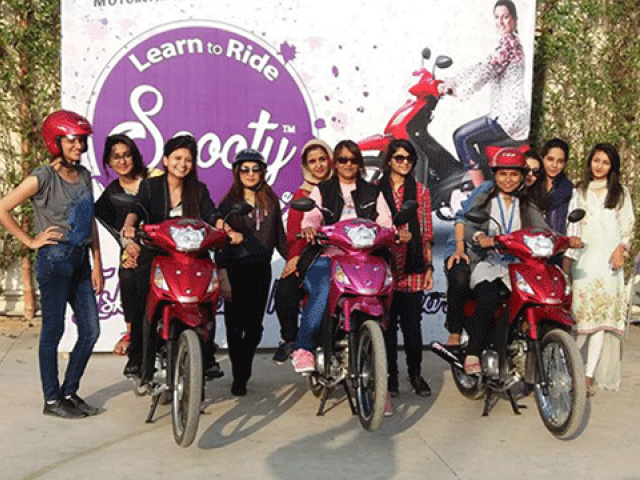She was perhaps the only one riding on two wheels in a world full of men. But, that was then. Now, within days, more than a thousand women have filled the application form to learn how to drive a scooty from Mehwish Ekhlaque. The applications are queuing up and they don’t have space for more.
“It has been my dream that a group of women ride with me, both for passion and as a means of commuting,” says Ekhlaque. Social media advertisements of the scooty driving workshops for women, advertised by Super Power Scooty, show Ekhlaque in her element. Helmet on, hair flowing out of it, with the protective gear on, totally in control – she is the image of an empowered woman that so many females in Pakistan want to emulate.
Faiza Saroj, a teacher, is one of Ekhlaque’s first students. Her husband is helping her get a grip of the scooty during recess. “This is a great new initiative. The stigma associated with women driving motorbikes has to end. We need a culture of acceptance for women who want to commute on motorbikes. I would love my daughter to learn to ride motorcycles too,” she says.Yet, stigmas are not easy to end, and the ride has not been easy for Ekhlaque as one of Karachi’s very few women who ride motorbikes regularly. While male-dominated groups of motorcycling aficionados have been encouraging and supportive, she struggles with the idea that motorcycling, both as a hobby and as a means of transport, remains limited to men. “A woman deserves the same sense of control a man gets when he kick-starts a motorbike. I belong on a motorbike. It makes me feel alive,” she expresses. However, Ekhlaque has had to be parts of all-men groups to take morning and evening rides and out-of-city motorcycle trips. “I don’t mind that, but we have to come to a point where women can also do this on their own,” she says.
In a city of over 20 million that still does not have a mass transit system, and a growing number of women pursuing professional careers, it is the need of the day that women have the option of using motorbikes as a means of transport. Yet, Karachi, a city where millions of motorcycles are registered and a much bigger number still unregistered, the number of women riding motorbikes can be counted on fingers. “I’m not learning this for recreation; it’s a need. Do people realise how difficult it is for girls who have to commute every morning from North Karachi to Saddar for work, changing many busses on way?” says Sarwat Muzammil. This young IT entrepreneur is a natural, according to Ekhlaque, and has learnt to ride the scooty within a day. “My father was initially reluctant; he was worried about my safety,” says Muzammil. “But once he met Mehwish, and we explained to him the reasons, he relented, and is in fact now encouraging me,” she shares.
Umair Malik and Haris Khan from the Pirani Group are part of the communications team that designed and marketed these workshops, and the response, they say, is more encouraging than they anticipated. “Mehwish is incredible. We were just testing the waters initially. Within days, we have realised the immense potential that lies in this,” says Malik.
The workshops are going to be conducted for three days every week – Friday, Saturday and Sunday – for the month of December at different locations in the city to enable the maximum number of women to benefit from the opportunity. And they are free of cost. They include both theory and practice. “Traffic laws for riding a motorcycle and safety protocol are part of the workshop,” confirms Ekhlaque.
However, these workshops are on for just a month, and each student will get a chance to learn for only two to three days. They will, at best, just give women a taste of the pleasure of riding a scooty, says Ekhlaque, who feels that she needs at least 10 to 15 classes with each student to bring them to a point that they are able to ride motorbikes confidently on their own in any part of the city, even during rush hours. “My dream is to have a motorcycling institute teaching women how to maneuver two-wheelers. But for that, I need support. I am hoping against hope that someone comes forth and invests in this cause. I need others who believe in this to join hands with me,” she expresses. The time is right. The demand is there. And so is the teacher. Are there any takers?

